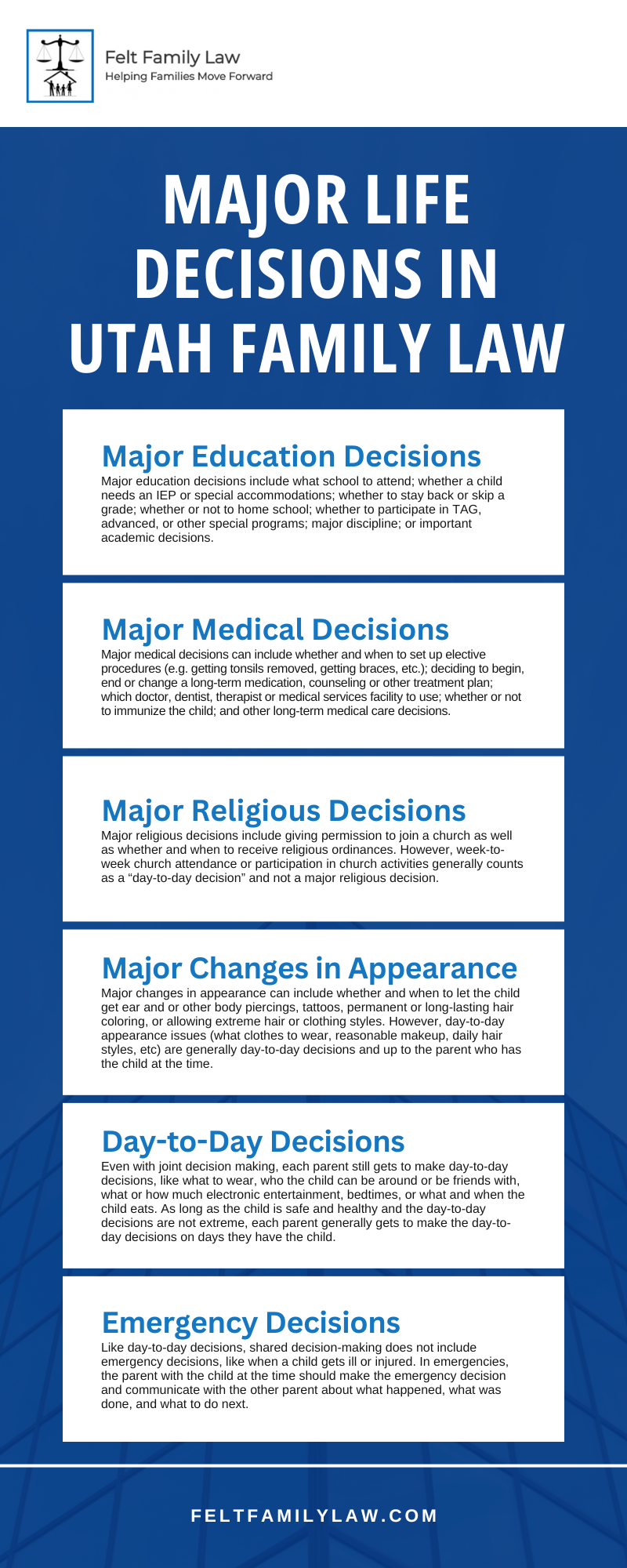Felt Family Law & Mediation
It’s In Our Name – It’s What We Do
UTAH FAMILY LAW EXPLAINED
TWO KINDS OF CUSTODY
There are two kinds of child custody in Utah – Legal Custody and Physical Custody. This article addresses Legal Custody.
LEGAL CUSTODY
Legal Custody in Utah boils down to two main ideas: (1) access to information and (2) decision-making authority. Utah favors awarding joint (or shared) legal custody in most cases, unless one parent or the other is incapable of co-parenting the child. Joint legal custody requires a co-parenting plan.
ACCESS TO INFORMATION
When parents share joint legal custody, each parent should have free or “unfettered” access to their child’s education records, medical records, and other personal and sensitive information.
Access to School Records: Access to school records means each parent can access the child’s attendance, report cards, IEP or special accommodations information, school discipline records and parent-teacher conferences. Parents can meet with teachers or administrators together or they can set up separate meetings (e.g. if the parents cannot make the same appointment or can’t stand to be in the same room with each other).
Each parent is responsible for their own access to school information, such as setting up their own school log in, contacting the school themselves, checking the school calendar or webpage, and keeping their contact information up to date. For joint legal custody, neither parent may block, remove or otherwise interfere with the other parent’s school access.
Access to Medical Information: Access to medical information is like the access to school records. For joint legal custody both parents have the right to be informed of all medical, dental or related appointments and procedures. Each parent is entitled to attend the appointments if they desire. Like with school records, both parents should be listed as emergency contact for each of the child’s doctors, dentists, or other medical care providers. Each parent is responsible for getting their own copies of medical records if desired.
IMPORTANT NOTE: Although neither parent may interfere with the other parent’s access to the child’s school and medical information, schools and doctors are not under the same restriction. A school or medical provider may refuse to work with a non-cooperative or belligerent parent under certain circumstances. So, even if parents are on the worst of terms with each other, it pays to stay on good terms with the child’s school and medical care providers.
Other Shared Information: Other shared information and documents can include access to access to copies of the child’s birth certificates, social security cards, church records, employment and insurance information, and other sensitive records. Again, while each parent gets unfettered access, each parent may be required to arrange and pay for their own copies of the records.
JOINT DECISION MAKING
Joint legal custody in Utah also means joint decision making. This means that parents should communicate and work together for major life decisions regarding the child. Major life decisions include important education, medical, and religious decisions, as well as major changes in appearance.
Major Education Decisions: Major education decisions include what school to attend; whether a child needs an IEP or special accommodations; whether to stay back or skip a grade; whether or not to home school; whether to participate in TAG, advanced, or other special programs; major discipline; or important academic decisions.
Major Medical Decisions: Major medical decisions can include whether and when to set up elective procedures (e.g. getting tonsils removed, getting braces, etc.); deciding to begin, end or change a long-term medication, counseling or other treatment plan; which doctor, dentist, therapist or medical services facility to use; whether or not to immunize the child; and other long-term medical care decisions. Setting up appointments and getting routine checkups generally do not count as a major medical decision, although both parents should receive advance notice of the appointment.
Major Religious Decisions: Major religious decisions include giving permission to join a church as well as whether and when to receive religious ordinances. However, week-to-week church attendance or participation in church activities generally counts as a “day-to-day decision” and not a major religious decision.
Major Changes in Appearance: Major changes in appearance can include whether and when to let the child get ear and or other body piercings, tattoos, permanent or long-lasting hair coloring, or allowing extreme hair or clothing styles. However, day-to-day appearance issues (what clothes to wear, reasonable makeup, daily hair styles, etc) are generally day-to-day decisions and up to the parent who has the child at the time.
Day-to-Day Decisions: Even with joint decision making, each parent still gets to make day-to-day decisions, like what to wear, who the child can be around or be friends with, what or how much electronic entertainment, bedtimes, or what and when the child eats. As long as the child is safe and healthy and the day-to-day decisions are not extreme, each parent generally gets to make the day-to-day decisions on days they have the child.
Emergency Decisions: Like day-to-day decisions, shared decision-making does not include emergency decisions, like when a child gets ill or injured. In emergencies, the parent with the child at the time should make the emergency decision and communicate with the other parent about what happened, what was done, and what to do next.
PRESUMPTION IN FAVOR OF JOINT LEGAL CUSTODY
Utah law sets a presumption in favor of joint legal custody. This means that unless there is a good reason to not share legal custody Utah courts will generally grant joint legal custody.
Reasons for not granting joint legal custody can include the following:
- History of and potential for abuse, neglect, kidnapping and or domestic violence
- A parent who refuses to or is incapable of communicating civilly or otherwise co-parenting with the other parent
- A parent who shows little or no interest in the child or the child’s welfare
- Physical distance making joint decisions impractical (although with the internet, texting, and video conferencing available, this reason is becoming less of a showstopper)
- A parent’s inability or lack of interest to accommodate the special needs of the child
- A parent who uses drug or alcohol to the point that they are incapable of making good decisions for the child
IMPORTANT NOTE: These are not the only factors the court may consider, and the presence of any of these factors does not necessarily prevent joint legal custody. Each case is different, and custody outcomes depend on numerous factors. Outcomes can vary greatly from case to case. If you have questions or concerns about your specific case, you should contact an attorney for legal advice.
Co-Parenting Plan: In all cases with joint legal custody, the parents are required to have a co-parenting plan. Among other provisions, the co-parenting plan outlines the procedures for joint decision making for major life decisions. The co-parenting plan also sets ground rules for how the parents should treat each other and communicate regarding their child.
IN A NUTSHELL: Joint legal custody in Utah means that parents are expected to continue working together and to share information about their child. Joint legal custody is the general rule, unless one parent or the other is incapable or refuses to work with the other parent for the child’s best interest. Parents with joint legal custody are expected to follow a co-parenting plan.
If you like this article, check out more of our articles here and like us on social media. For legal advice about your specific case, contact us here.
Utah Family Law Infographic

Creating A Parenting Plan For Legal Joint Custody
At Felt Family Law & Mediation, our Utah family lawyer recognizes the importance of creating a comprehensive parenting plan to facilitate smooth legal joint custody arrangements. Here are some frequently asked questions about how a parenting plan can help.
What Is A Parenting Plan, And Why Is It Important In Legal Joint Custody?
A parenting plan is a detailed document that outlines the responsibilities of each parent in a joint custody arrangement. It covers various aspects of co-parenting, including decision-making authority, visitation schedules, communication protocols, and methods for resolving disputes. Having a well-crafted parenting plan is essential for clarifying expectations and minimizing conflicts between parents, thus promoting stability and predictability for the child.
What Should Be Included In A Parenting Plan For Legal Joint Custody?
As our Utah family lawyer can tell you, a parenting plan should address key issues relevant to the child’s upbringing and well-being. This includes outlining the division of decision-making authority between parents, establishing a regular visitation schedule that considers the child’s needs and preferences, specifying arrangements for holidays and vacations, defining methods for resolving disputes, and outlining protocols for communication between parents. Additionally, the plan may address logistical details such as transportation arrangements and provisions for sharing expenses related to the child’s care.
How Can A Parenting Plan Help Parents Navigate Co-parenting Challenges In Joint Custody Arrangements?
A well-crafted parenting plan serves as a roadmap for co-parenting, providing clear guidelines and expectations for both parents. By establishing a framework for decision-making and communication, the plan helps minimize conflicts and promote cooperation between parents. It also provides a mechanism for addressing potential issues and resolving disputes in a constructive manner, thus reducing the need for court intervention. Ultimately, a parenting plan empowers parents to work together effectively in the best interests of their child.
Can A Parenting Plan Be Modified If Circumstances Change?
Yes, parenting plans can be modified if circumstances warrant a change. Life circumstances such as relocation, changes in work schedules, or the child’s evolving needs may necessitate modifications to the parenting plan. In such cases, parents can seek to renegotiate the terms of the plan through mediation or, if necessary, petition the court for a modification. Our experienced mediators can assist parents in navigating the process of modifying a parenting plan to ensure that it continues to meet the needs of the child and both parents.
How Do I Get Started With Creating A Parenting Plan For My Legal Joint Custody Arrangement?
If you’re considering creating a parenting plan for your joint custody arrangement, we encourage you to schedule a consultation with our team. During this initial meeting, we’ll discuss your unique circumstances, explain the importance of a parenting plan, and guide you through the process of creating a customized plan that meets your needs and promotes the best interests of your child. Don’t hesitate to reach out to us today to take the first step toward establishing a solid foundation for co-parenting success.
At Felt Family Law & Mediation, we’re here to support you every step of the way. Contact our Utah family lawyer today to schedule your consultation and begin creating a parenting plan that sets the stage for effective co-parenting in your legal joint custody arrangement.
This article is intended for general information purposes and should not be construed as legal advice. For legal advice about Utah Family Law or about your specific case, contact an attorney near you.


